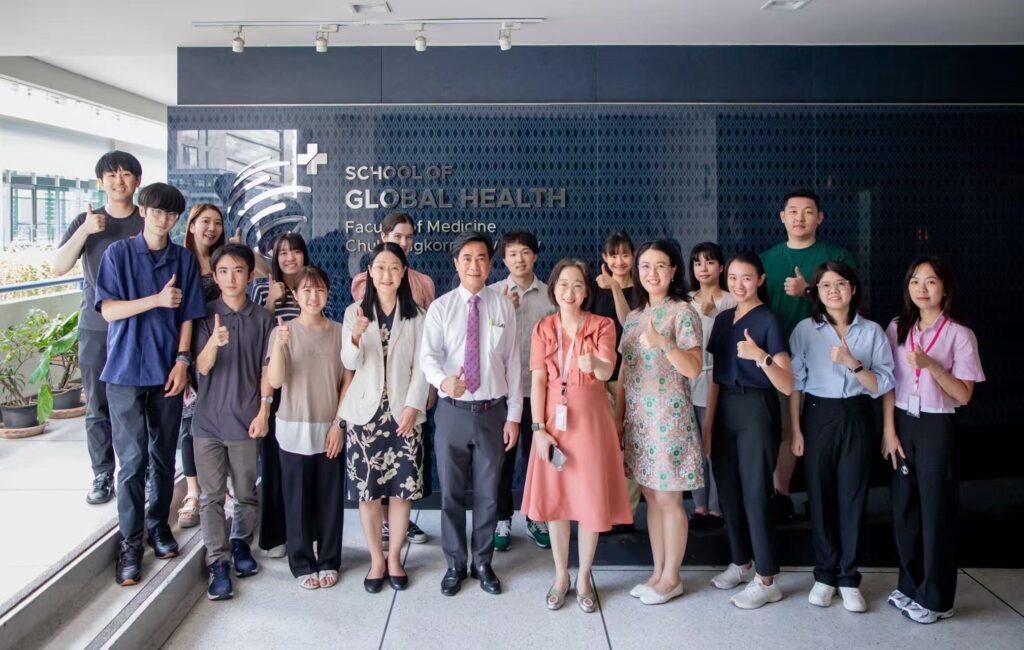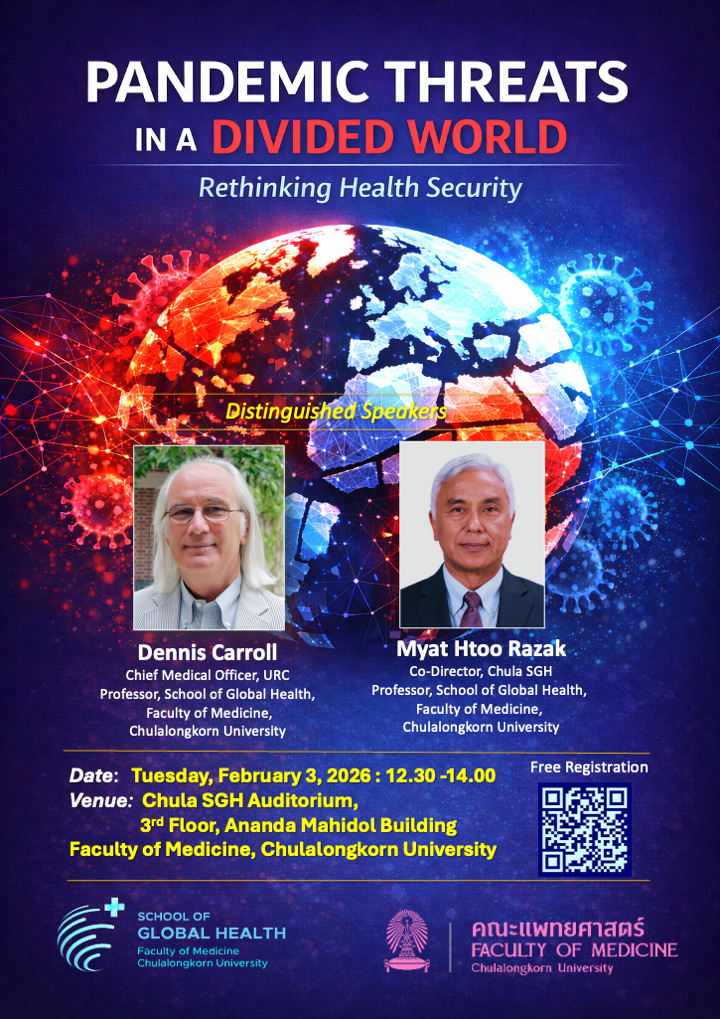School of Global Health and the University of Tokyo Explore the Integration of Traditional Wisdom and Global Health
Bangkok, August 29, 2025 — The School of Global Health, Faculty of Medicine, Chulalongkorn University, successfully hosted the event “Global Health Through Traditional Wisdom.” Students from Chulalongkorn University and the University of Tokyo participated in the event, with the UTokyo participants joining through the University of Tokyo Hands-on Activity Program “Thai Traditional Medicine and Health Promotion Policy: Exploring Its Globalization.” Together, they engaged in lectures, site visits, and cultural experiences. The event highlighted the value and potential of traditional medicine in modern global health systems, with a particular focus on its applications and innovations in global health.

Tradition Meets Modernity: From Traditional Medicine to Health Systems
The event was held at the Ananda Mahidol Building and featured a diverse program. In the opening session, Professor Suttipong Wacharasindhu, Senior Executive Committee Member of the School of Global Health, emphasized: “Traditional medicine is not only cultural heritage, but also an essential resource for addressing today’s health challenges.” The integration of traditional wisdom with modern scientific innovation is essential for strengthening health systems and advancing global health.

Students then visited the Chulalongkorn Centre of Excellence for Parkinson’s Disease & Related Disorders and the Chulalongkorn University Herbs Museum, gaining insights into the use of traditional Thai Massage in neurorehabilitation and everyday health management. At the Faculty of Sports Science, Chulalongkorn University, they learned exercise physiology related to cultural movement and also participated in Thai traditional dance, experiencing its role as a non-pharmacological intervention for health promotion, led by Asst Prof. Surasa Khongprasert.
Planetary Health and Food Culture: Contemporary Insights from Tradition
In the afternoon lecture session, Dr. Bumi Herman presented “Planetary Health in Practice: How Traditional Medicine Teaches Us Sustainability.” He discussed how climate change and environmental challenges—such as extreme heat and air pollution—are complicating chronic disease management, while community-based care and traditional resources can play a critical role.
Dr. Syarifah Agilah from Mahidol University shared her research on “Food, Culture, and Motivation: Understanding Youth Dietary Practices in Indonesia.” She demonstrated how cultural identity, peer influence, and self-perception shape young people’s eating behaviors.
Traditional Flavors: Thai Medicinal Cuisine and Healthy Snacks
The event also offered participants the chance to taste wisdom in action. At lunch, students enjoyed traditional Thai dishes such as Tom Kha Gai (chicken coconut soup) and Gaeng Pa Gai (jungle curry chicken), made with herbs like galangal, lemongrass, and kaffir lime leaves—ingredients valued for both flavor and health benefits. During the afternoon session, students prepared and tasted Miang Kham, a traditional snack made by wrapping coconut, peanuts, ginger, and lime in wild betel leaves, embodying the Thai culinary philosophy of “four-flavor balance.”
Cross-Cultural Dialogue: Perspectives from the University of Tokyo
Students from the University of Tokyo reflected on similarities and differences between Thai and Japanese traditional medicine. They considered the role of traditional medicine in modern societies and the challenges it faces. One student noted: “Thailand’s policy of integrating traditional medicine into its universal health coverage system is impressive and something Japan could learn from.”
Traditional Wisdom in Women’s Health: Leadership and Collaboration
The “Global Health Through Traditional Wisdom” initiative, led by the School of Global Health, Faculty of Medicine, Chulalongkorn University, seeks to bridge traditional medicine and modern global health systems, with particular attention to community-based care and sustainable development. As part of this effort, the event spotlighted women’s health. Dr. Jiayu Li, Lecturer and Coordinator of the Global Women’s Health Internship Program, introduced initiatives encouraging students to examine women’s health through traditional practices, community midwifery, and cross-cultural perspectives, with growing attention to traditional medicine and community self-care. Complementing this, Dr. Yuka Miyahara served as the program leader for the University of Tokyo participants. A PhD alumna of Chulalongkorn University’s Faculty of Medicine, she is a lecturer and researcher at Wat Pho Thai Traditional Medical School and a part-time lecturer at the University of Tokyo (College of Arts and Sciences), where she teaches the Thai Medicine Seminar. Her work specializes in Thai medicine, with a focus on massage and other non-pharmacological interventions in neuroscience, including women’s health. Her recent award-winning research reviewed the effectiveness of touch-based therapies in managing menopausal symptoms, adding valuable scientific evidence to the integration of traditional medicine in modern health systems.
Moving forward, the School of Global Health will continue to advance this mission through research, education, and international collaboration.
More information: Dr. Jiayu Li <jiayu.l@chula.ac.th>






